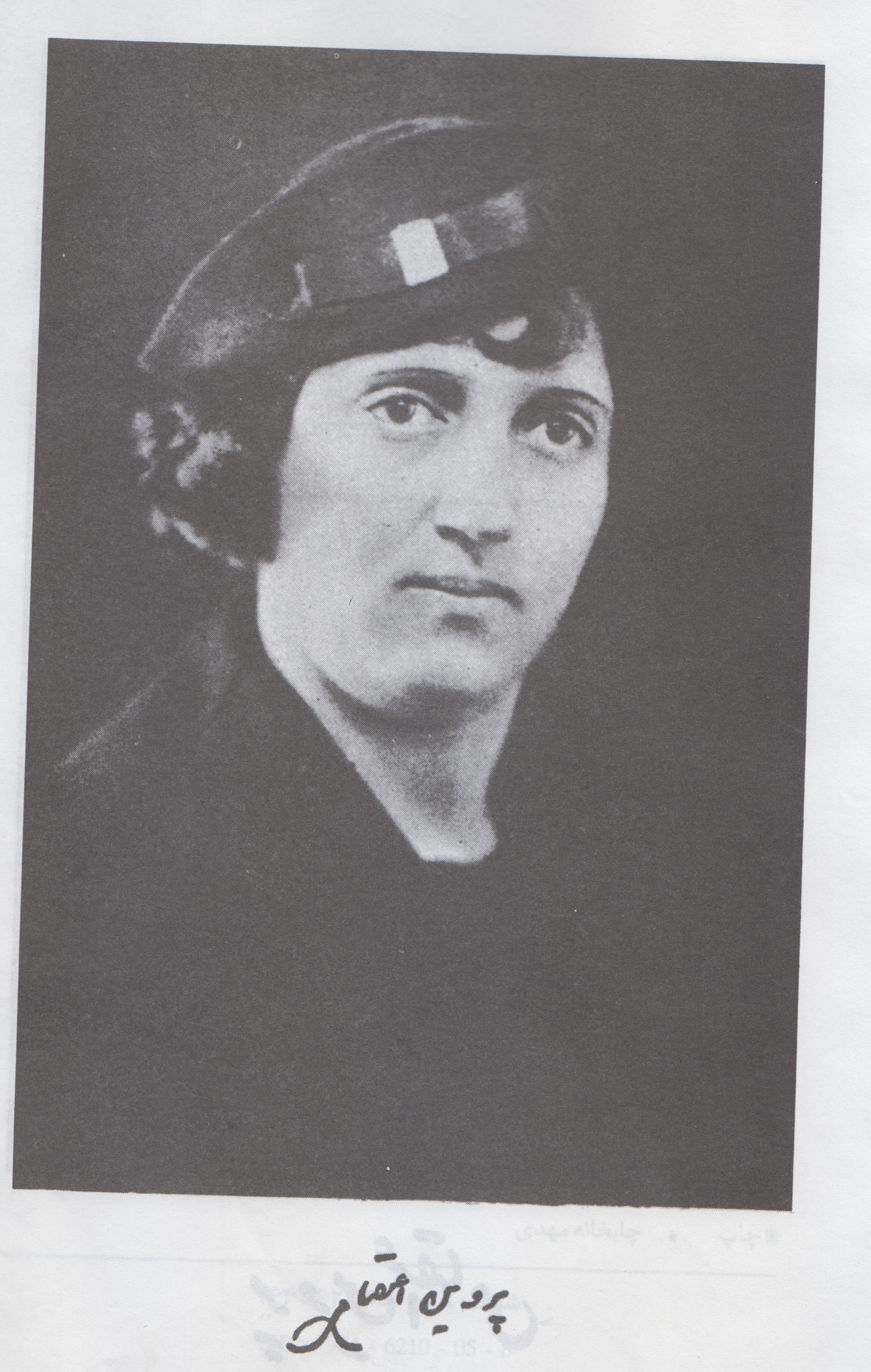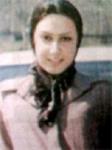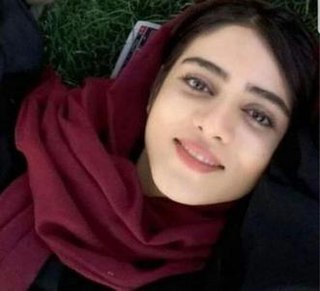
Shirin Ebadi is an Iranian political activist, lawyer, a former judge and human rights activist and founder of Defenders of Human Rights Center in Iran. On 10 October 2003, Ebadi was awarded the Nobel Peace Prize for her significant and pioneering efforts for democracy and human rights, especially women's, children's, and refugee rights.

Parvin E'tesami also known as Rakhshandeh Etesami, and Parvin Etesami, was an Iranian 20th-century Persian poet.
Throughout history, women in Iran have played numerous roles, and contributed in many ways, to Iranian society. Historically, tradition maintained that women be confined to their homes so that they could manage the household and raise children. During the Pahlavi era, there was a drastic change towards women's segregation: ban of the veil, right to vote, right to education, equal salaries for men and women, and the right to hold public office. Women were active participants in the Islamic Revolution. Iran's constitution, adopted after the Islamic Revolution in 1979, proclaims equality for men and women under Article 20, while mandating legal code adhering to Sharia law. According to Sharia, women inherit half of what a man would, and compensation for the death of a woman is also half. Sharia law still favors men, but Article 21 of the constitution as well as a few parliament-passed laws give women some rights. Women are allowed to drive, hold public office, and attend university. Not wearing a veil in public can be punished by law; and when in public, all hair and skin except the face and hands must be covered. However, this is not practiced effectively; particularly in recent years, Iranian women have created many movements to fight back against the restrictive laws by the government and gain back their rights and freedom.
Islamic feminism is a form of feminism concerned with the role of women in Islam. It aims for the full equality of all Muslims, regardless of gender, in public and private life. Islamic feminists advocate women's rights, gender equality, and social justice grounded in an Islamic framework. Although rooted in Islam, the movement's pioneers have also utilized secular, Western, or otherwise non-Muslim feminist discourses, and have recognized the role of Islamic feminism as part of an integrated global feminist movement.

The state of human rights in the Islamic Republic of Iran has been criticized by Iranians and international human right activists, by writers, and NGOs. The United Nations General Assembly and the Human Rights Commission have condemned prior and ongoing abuses in Iran in published critiques and several resolutions. The government is criticized both for restrictions and punishments that follow the Islamic Republic's constitution and law, and for "extrajudicial" actions by state actors, such as the torture, rape, and killing of political prisoners, and the beatings and killings of dissidents and other civilians. Capital punishment in Iran remains a matter of international concern.

Parvin Darabi is an Iranian-born American activist, writer and defender of women’s rights.
During the late 20th and early 21st centuries in Iran, women's rights have been severely restricted, compared with those in most developed nations. The World Economic Forum's 2017 Global Gender Gap Report ranked Iran 140, out of 144 countries, for gender parity. In 2017, in Iran, females comprised just 19% of the paid workforce, with seven percent growth since 1990. In 2017, the Georgetown Institute for Women, Peace and Security (WPS) Index ranked Iran in the bottom tercile of 153 countries. Compared to other South Asian regions, women in Iran have a better access to financial accounts, education, and cellphones. Iran was ranked 116, out of the 153 countries, in terms of legal discrimination against women.

Delara Darabi was an Iranian Gilaki woman who was sentenced to death after having been convicted of murdering her father's female cousin in 2003. Although Delara initially claimed that she had committed the crime, she subsequently recanted and explained that her older boyfriend, Amir Hossein, had persuaded her to lie about the incident to protect him. According to Delara and other sources familiar with the case, Amir Hossein was the person who had committed the murder in an attempt to steal from a wealthy member of the Darabi family. She was hanged in Rasht Prison on 1 May 2009.

Homa Darabi was an Iranian pediatrician, academic, and political activist affiliated with the Nation Party of Iran. She is known for her political self-immolation in protest to the compulsory hijab, which led to her death.

From the Imperial Pahlavi dynasty, through the Islamic Revolution (1979), to the era of the Islamic Republic of Iran, government treatment of Iranian citizens' rights has been criticized by Iranians, by international human rights activists, by writers, by NGOs and the United States. While the monarchy under the rule of the shahs was widely attacked by most Western watchdog organizations for having an abysmal human rights record, the government of the Islamic Republic which succeeded it is considered still worse by many.

Masih Alinejad is an Iranian-American journalist, author, and women's rights activist. Alinejad currently works as a presenter/producer at VOA Persian Service, a correspondent for Radio Farda, a frequent contributor to Manoto television, and a contributing editor to IranWire.

The Iranian Women's Rights Movement, is the social movement for women's rights of the women in Iran. The movement first emerged after the Iranian Constitutional Revolution in 1910, the year in which the first women's periodical was published by women. The movement lasted until 1933 when the last women's association was dissolved by the government of Reza Shah Pahlavi. It rose again after the Iranian Revolution in 1979.

The term ḥijāb (hijab) is used in the Quran to denote a partition, a curtain, or is sometimes used for the Islamic rules of modesty. This is the usage in the verses of the Qur'an, in which the term hijab sometimes refers to a curtain separating visitors to Muhammad's main house from his wives' residential lodgings.

On 8 January 1936, Reza Shah of Iran (Persia) issued a decree known as Kashf-e hijab banning all Islamic veils, an edict that was swiftly and forcefully implemented. The government also banned many types of male traditional clothing. Since then, the hijab issue has become controversial in Iranian politics. One of the enduring legacies of Reza Shah has been turning dress into an integral problem of Iranian politics.

The Guidance Patrol, or morality police, is a vice squad/Islamic religious police in the Law Enforcement Command of Islamic Republic of Iran, established in 2005 with the task of arresting people who violate the Islamic dress code, usually concerning the wearing by women of hijabs covering their hair.

The Girls of Enghelab protests are protests against the compulsory hijab in Iran, part of the wider Iranian Democracy Movement. The protests were inspired by Vida Movahed, an Iranian woman known as the Girl of Enghelab Street, who stood in the crowd on a utility box on Enghelab Street in Tehran on 27 December 2017 during the 2017–2018 Iranian protests who tied her hijab, a white headscarf, to a stick, and waved it to the crowd as a flag. She was arrested on that day and was released temporary on bail a month later, on 28 January 2018. Some people interpreted Movahed's action as being based on Masih Alinejad's call for White Wednesdays, a protest movement that the presenter at VOA Persian Television started in early 2017. Other women later re-enacted her protest and posted photos of their actions on social media. These women are described as the "Girls of Enghelab Street" and the "Girls of Revolution Street" in English sources. Some of the protesters however claim that they were not following Masih Alinejad's call. The protests intensified in 2022 due to the death of Mahsa Amini.

Sahar Khodayari, also known as Blue Girl was an Iranian fan of Esteghlal F.C. In March 2019, she attempted to enter the male-only Azadi Stadium disguised as a man to watch a match played by the team, against the national ban on women at such events. On 2 September the same year, she was told by the Islamic Revolutionary Court of Tehran that she may face a six-month prison sentence. After leaving court, she died by suicide through self-immolation in front of the building. She died a week later of her injuries. Khodayari's self-immolation has generated much debate in Iran about the government's restrictions on women.

On 16 September 2022, a 22-year-old Iranian woman named Mahsa Amini, also known as Jina Amini, died in a hospital in Tehran, Iran under suspicious circumstances. The Guidance Patrol, the religious morality police of Iran's government, arrested Amini for not wearing the hijab in accordance with government standards. The Law Enforcement Command of Islamic Republic of Iran stated that before transferring her to the hospital, she had a heart attack at a police station, collapsed, and fell into a coma. However, eyewitnesses, including women who were detained with Amini, reportedly said she was severely beaten, and that she died as a result of police brutality, which was denied by Iranian authorities. These assertions, in addition to leaked medical scans, led independent observers to believe Amini had had a cerebral hemorrhage or stroke.

An ongoing series of protests and civil unrest against the government of Iran began in Tehran on 16 September 2022 as a reaction to the death of 22-year-old Mahsa Amini, who had been arrested by the Guidance Patrol for wearing an "improper" hijab — in violation of Iran's mandatory hijab law — while visiting Tehran from Saqqez. According to eyewitnesses, Amini had been severely beaten by Guidance Patrol officers, an assertion denied by Iranian authorities.















